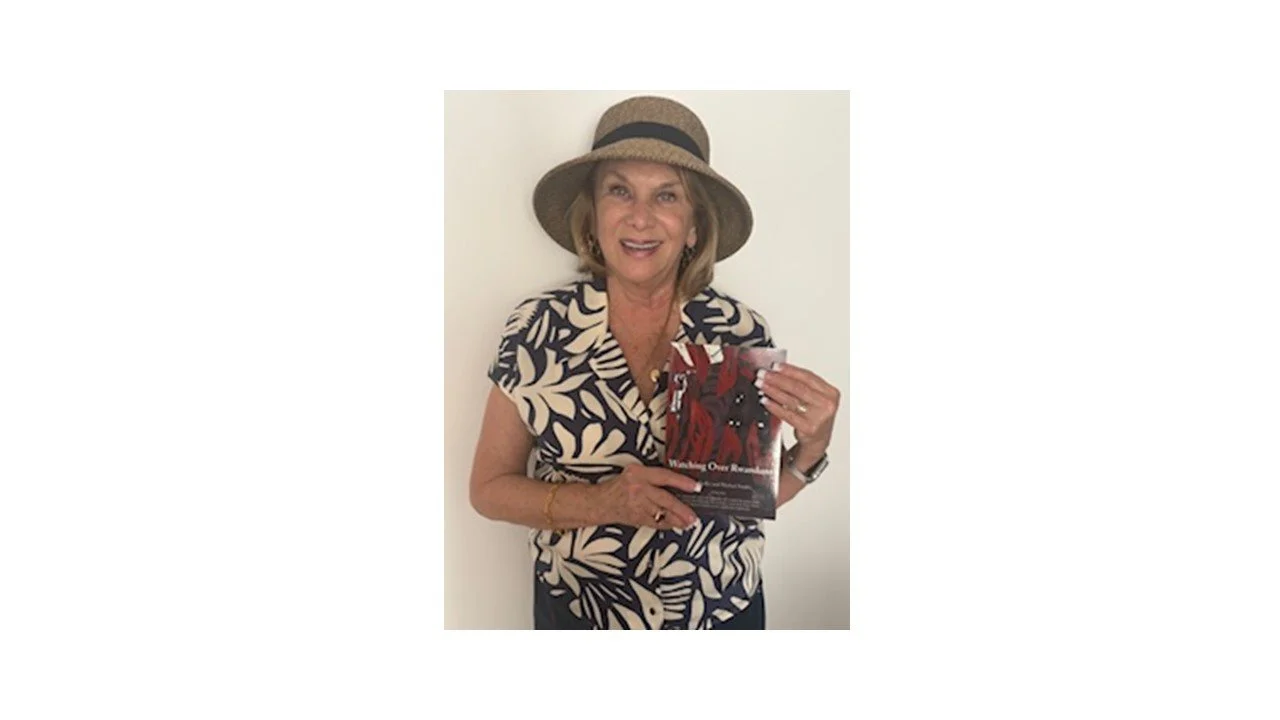Ilene Sheffer and the power of women in academia to do good in the world
Ilene Sheffer with her book “Watching Over Rwandans” (Photo by R. Sheffer)
In “Watching Over Rwandans,” author Ilene Sheffer describes her efforts to help save students from Rwanda during the 1994 genocide and relates the personal stories of seven Rwandan international students. Together, their stories remind us of the power of academics to do good in the world.
By Ilene Sheffer with Patricia A. Maurice and Janet G. Hering
19 August 2025, DOI: 10.5281/zenodo.16522090
A native of Brooklyn, New York, Ilene Sheffer has had an illustrious career in elementary, secondary school, and higher education [1]. She has held positions in upper administration at community colleges and universities. Retired since 2016, she has served as chief campaign strategist for a charity and as an officer of a local economic club.
From 1991 through 2003, Sheffer was Vice President for Community Services and Development at Southwestern Michigan College. Her tenure in this position overlapped with the Rwandan genocide of 1994. Many of us have probably watched the 2004 Academy-award-nominated film Hotel Rwanda about a hotelier who sheltered and saved the lives of over a thousand refugees during this crisis. But we are likely unaware of the many people around the world who found themselves drawn into the conflict and called upon, directly or indirectly, to help save lives.
In her role as Vice President, Sheffer interacted with a group of international students from Rwanda studying at her college during the Rwandan Civil War and the genocide. She realized they were at risk of deportation, which would put them in a life-threatening situation. Sheffer kicked into gear and came up with ways to ensure that the Rwandan students could stay legally in the United States. She kindly agreed to be interviewed about her experiences and the book she wrote with Michael Snyder, titled Watching Over Rwandans [2].
Can you tell us briefly about the horrors that were happening in Rwanda in the mid-1990s?
In 1994 my students and former students at Southwestern Michigan College were notified that their families were herded into soccer stadiums and hacked to death with machetes. Refugees who fled to Belgium (a French speaking country like Rwanda) called the students in the US to give them the horrific news.
How did you come to intervene on behalf of Rwandan students?
I was the international student advisor as a collateral appointment to being the Dean of Admissions from 1985-1991. All of the 138 international students passed through my office for their immigration paperwork. In 1994, 45 of these students were from Rwanda.
I was the VP of Community Services and Development in 1994 when the holocaust happened in Rwanda. I was the ‘earth mother’ to my former students when they learned about the terror in their homeland.
I contacted US Representative Fred Upton’s office for clarity on this global problem. He represented the town of Dowagiac where the college was located but had no intelligence regarding the genocide. My students lost their entire families in many cases and had nowhere to go for governmental assistance.
I felt I had no choice but to convene a meeting with the Rwandans deciding on our next steps. For many of the students, we were able to arrange co-op jobs so they could stay legally in the US. Others were able to make it to Canada which was more welcoming to granting asylum to Rwandans at risk.
What challenges did you and the students face in attempting to save them from deportation?
The ambassador from Rwanda was Hutu, the ethnic group that perpetrated the genocide. My students were Tutsi (the main ethnic group that was targeted). The ambassador wanted the names, addresses and phone numbers of my students. I refused as it would have led to the deportation of my students and sent them to their death.
In reprisal, the ambassador sent my name to the FBI as a subversive. Fortunately, when the FBI arrived at my office and ‘interrogated’ me they realized I was nothing of the sort.
What was there about your own life story, background, and character that led you to help the students?
I was raised to do the right thing. My parents — particularly my dad — had moral certainty when it came to right and wrong. There was no grey area.
To NOT help those wanting to go to Canada for political asylum or to find work in the US for the students without funds was never an option. The Jewish mother in me had to protect them.
Someone once asked me if it was divine intervention as my heritage would have been through the Jewish Holocaust with the same terror and mass murder. Frankly I don’t know but I do know the shining achievement in my 76 years on earth was protecting those 45 students.
Do you continue to stay in touch with these former students, and if so, how are they doing?
Yes. I remain very close to dozens of my former Rwandan students. We did a big reunion in 2004, and I have been to weddings, graduations and funerals. They are my children and grandchildren.
What did you learn from your experiences that could help other senior women leaders in academia navigate future challenges?
The lesson is “trust your gut”. Your gut is always your second brain. When you feel you can right a wrong — don’t hesitate. To save one life is to save mankind!
Conclusion and questions for further thought
Ilene Sheffer’s book is beautifully written and tells stories of some amazing students who endured overwhelming hardships. The book particularly resonated with Patricia who had a brilliant Croatian graduate student, Ksenija, who had survived the bombings in Zagreb in the early 1990s. Her husband was caught behind enemy lines while she was beginning her PhD studies at Kent State University. Fortunately, he finally made his way home and was able to get a visa to join her in the US. It was remarkable to witness her fortitude as she dealt not only with her own memories of the war but also with many months of awaiting news of her husband and family. At the same time, another student, from China, could not return home for many years because she had been active in the student movement and had friends who had died in the Tiananmen Square massacre.
We encourage all of our friends and colleagues to read the book “Watching over Rwandans” to remind ourselves of the difference one person can make in the world. As we wrote in our post on teaching, our students are our greatest joys and privileges [3]. Many academics think of our former students, just as Ilene Sheffer does, as our children. We need to help ‘watch over’ them when they experience times of great need.
In closing, here are a few questions for our readers to stimulate further thought and discussion:
· What do you know about the Rwandan genocide and its aftermath?
· Have you experienced or observed academics working to do good in the world?
· Are you aware of the organization Scholars at Risk [4], and if so, does your institution cooperate with them?
· How much do you know about the lives and experiences of your students, and do you have a sense of how you have impacted their lives?
References and notes
[1] https://www.linkedin.com/in/ilene-sheffer-b2b4258/
[2] Sheffer, I. and Snyder, M. (2017) Watching Over Rwandans, Wolfson Press, 118 pp., ISBN 978-1978246386
[3] https://www.epistimi.org/blog/our-students-are-our-greatest-gifts-and-our-proudest-legacies

